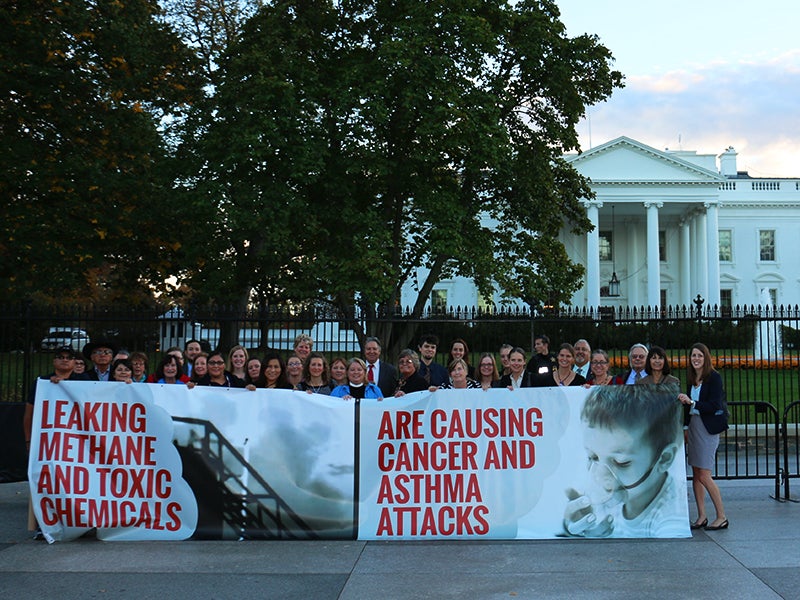Methane Fighters Take on Washington
Thirty-five people from 12 different states visited Washington, D.C., to share their stories with their representatives in an effort to build support for the EPA’s newly proposed Methane Pollution Standard.
Earthjustice and partner groups flew 35 people from 12 states to Washington D.C. to tell policy makes just how much methane pollution from oil

This page was published 10 years ago. Find the latest on Earthjustice’s work.
Imagine a life where your every decision is dictated by the air quality in your neighborhood. Want to take a walk around the block? Let me check if the oil well down the street is “flaring” (releasing harmful pollution into the air while burning gas). Want to play a baseball game? Let’s check the news to see if it’s a bad air day, and if we’re good to go, let’s not forget an inhaler on our way out the door, just in case.
Now imagine a life where air pollution has really taken its toll on your family. You’re excited for your grandchild to blow out his birthday candles, only to hold back tears when you see him struggling to breathe. You see your daughter gain a little bit of weight because it’s unhealthy for her to exercise outside, only to have your heart broken when the doctor tells you that the little bit of weight is actually a tumor.
For the folks who attended our November fly-in event, this is their reality. Earlier this month, 35 people from 12 different states came to Washington, D.C. with one message: clean up the oil and gas industry’s air pollution. Throughout the week, they shared their stories with their representatives and other political decision makers in an effort to build support for the EPA’s newly proposed Methane Pollution Standard.
Why methane? The oil and gas industry is carelessly leaking millions of tons of methane pollution and toxic chemicals into the air that harm our health and speed up climate change. Methane pollution is to blame for a quarter of man-made climate change. Pound for pound, the gas traps more than 80 times as much heat in the short term as carbon dioxide. As methane speeds the pace of climate change, it is also emitted alongside ozone-forming pollution associated with unhealthy levels of smog. Ozone pollution is linked to asthma attacks, heart disease and premature death. The EPA’s new methane rule will help protect Americans using low-cost pollution safeguards that already exist.
Chaz Tedesco, Adams County (Colorado) Commissioner, came to D.C. from a state that has already put in place the strictest methane standards in the country. Yet his state is still a hotbed for methane partly due to the methane that drifts in from other states. He talked about concerns his constituents have with oil and gas development continuously moving into their neighborhoods. While many of his constituents aren’t against oil and gas development per se, they do expect the industry to be held to the highest standards. The EPA’s new proposal is one way to do that.
Mother-daughter team Kristi and Kylee Mogen came to D.C. from South Dakota, where they were forced to move after health impacts from oil development in Wyoming overwhelmed their family and their farm. Kristi and Kylee shared photos of plants on their farm dying as a result of flaring oil wells surrounding their property. And 14-year-old Kylee told of a nosebleed that took 21 days to stop and subsequent nosebleeds that occurred every couple of days until her family moved.
Registered Nurse and adjunct professor at Case Western Reserve University Susan Tullai-McGuinness shared the story of her grandkids, three of whom have asthma and are forced to stay inside on poor air quality days. Tullai-McGuinness presented data showing that 14 percent of people in Ohio will suffer from asthma at some point in their lifetimes—and that those numbers go up for people living close to fracking operations. If the EPA’s proposal is enacted and industry is required to capture methane emissions, there is a side benefit: a reduction in volatile organic compounds, which are known to aggravate asthma and other respiratory conditions.
This is just a snapshot of the fly-in conversations regarding air pollution from the oil and gas industry. The message from impacted communities was clear—oil and gas needs to clean up its act, and the EPA’s proposal is a great step toward making that happen. By reducing methane and other emissions, the EPA can clean up both our climate and the health of people living near oil and gas facilities.
Established in 1989, Earthjustice's Policy & Legislation team works with champions in Congress to craft legislation that supports and extends our legal gains.